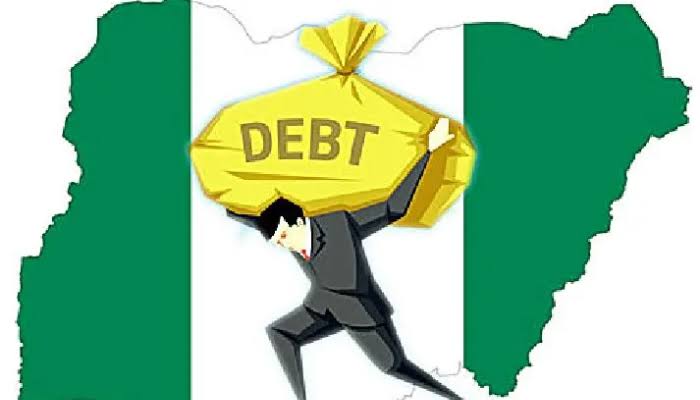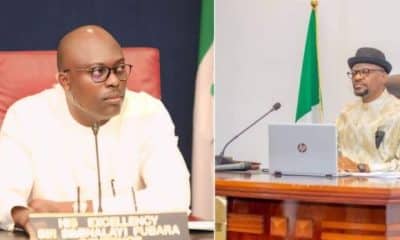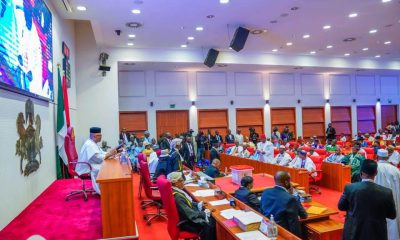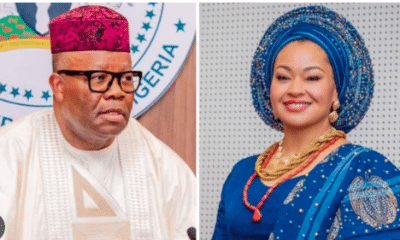Business
Rising Debt Profile: A Ticking Time Bomb For Nigeria

By Richard Ogunsile and Chukwuani Victoria
When a country borrows hugely either internally or externally, there is an expectation the borrowed funds will impact its economy positively, and will as well guarantee sustainability if deployed in a transparent manner.
It is no longer news that the debt incurred already by the Nigerian government over several years has had the country’s name boldly written and listed among nations with a high gross debt profile.
Naija News understands that borrowing is required for visible development expenditure like power projects, and establishing heavy industries, hence, it is not a crime for a country to borrow.
It is disturbing, however, when a country borrows even more to outweigh its revenue mobilisation capacity.
This is the case with the Nigerian government and the incumbent administration led by President Muhammadu Buhari has not slowed down in its borrowing streak.
The Lagos Chamber of Commerce and Industry, LCCI recently expressed its worries over the development.
The firm in its recent publication, addressed the incumbent government, suggesting a review of the borrowing parameters based on the country’s Debt-to-Revenue Ratio.
LCCI noted in its publication that dwelling on the current Debt-to-GDP threshold is an unreliable means of calibrating Nigeria’s current debt burden.
In a swift response, the Debt Management Office (DMO), acknowledged that the government has truly obtained huge loans in the last few years.
It explained, however, that it is aware of the country’s relatively high Debt Service-to-Revenue Ratio and has published the figures over the years, as well as included them in public presentations.
The DMO stressed that the primary reason for the high Debt Service-to-Revenue Ratio is that Nigeria’s revenue base is low.
It explained further that the country is largely dependent on the sale of crude oil, as a major revenue source.
The DMO said: “If Nigeria, with a Revenue-to-GDP Ratio of 9%, generated revenues close to countries such as Kenya, Ghana and Angola with Revenue-to-GDP Ratios of 16.6%, 12.5% and 20.9% respectively, then, its Debt Service-to-Revenue would be lower.
“This position is buttressed by the fact that the highlighted countries have higher Public Debt-to-GDP Ratios (Kenya: 67.6%, Ghana: 78.9% and Angola: 136.5%) compared to Nigeria (22.80%) yet record relatively lower Debt Service to Revenue Ratios due to their higher Revenue-to-GDP Ratios.”
The firm which is saddled with the responsibility of informing the general public on the government’s debt status, said infrastructure development, job creation and economic growth, in the face of relatively low revenues, requires the Government to borrow, at least in the short term.
It said: “Due to the low revenue base, the FGN is already implementing measures to increase and diversify revenues and subsequently, lower Debt Service-to-Revenue Ratio. Among these initiatives are the Strategic Revenue Growth Initiative (SRGI) and the annual Finance Acts.
“To reduce the level of direct borrowing, the Government also actively engages the private sector to participate in infrastructure development through various initiatives such as the Infrastructure for Tax Credit Scheme, the establishment of the Infrastructure Corporation of Nigeria Limited and other Public-Private Partnership arrangements that are guaranteed by the Government.
“We agree with the LCCI, that measures to increase revenues should be initiated by the public sector. In addition, organisations such as the LCCI are encouraged to support the Government in its revenue growth drive, which will subsequently reduce the Debt Service-to-Revenue Ratio,” the statement noted.
Naija News can authoritatively report that in the last four administrations, only Chief Olusegun Obasanjo-led government was able to secure a debt relief so far.
How Nigeria Fared Under Chief Olusegun Obasanjo
Naija News recalls that Nigeria’s exchange rate was between N98.02 to N116.8 to a dollar during Obasanjo’s regime.
The country’s debt level reduced from N3.55 trillion in 1999 to N2.42 trillion at the end of 2007.
Federal Government’s local and foreign debt levels dropped, representing a 31.8 per cent decline.
Analysis of the figures showed that external debt decreased from $28.04 billion by 1999 to $2.11 billion at the end of 2007. However, the domestic component increased from N798 billion to N2.17 trillion within the same period.
The huge decline in foreign debt was a result of the substantial reduction following the pay-off of the outstanding debts owed to the London Clubs of Creditors in the first quarter of 2007, TheCable noted in a report.
Successive governments have since continued on a borrowing spree.
Nigeria’s Debt Profile Under President Umar Musa Yar’Adua/Goodluck Jonathan
Late Yar’Adua came on board in the year 2007 and his government moved the dollar to Naira exchange to N156.7/$1.
Nigeria’s domestic debt at the time leapt from N2.17 trillion to N5.62 trillion.
The foreign component of the debt also increased from $2.11 billion to $3.5 billion within the period.
The combined debt profile increased from N2.42 trillion to N6.17 trillion in four years, representing a 155 per cent increase.
Naija News recalls that Yar’Adua died in office and Jonathan had to complete the tenure from May 2010 to May 2011.
Within that time, the federal government’s debt surged from N4.94 trillion to N6.17 trillion. This represents a 24.9 per cent increase in one year.
Nigeria’s Debt Profile Under President Goodluck Jonathan
It could be recalled that the Otuoke-born politician was sworn in as Nigeria’s president on 29 May 2011 following the demise of his principal, Umaru Musa Yar’Adua and election.
Recall that before Jonathan’s takeover, the federal government had an accumulated debt of N6.17 trillion.
Under Jonathan, verifiable financial analysis of the debt figure showed that local debt amounted to N5.62 trillion while foreign debt stood at $3.5 billion (about N548.65 billion, using the exchange rate of N156.7/$1).
By the end of 2015 when the Bayelsa man’s tenure had elapsed, the foreign debt component hit $7.3 billion, while domestic debt increased by N8.4 trillion.
Overall, the federal government component of the total public debt increased from N6.17 trillion in 2011 to N9.8 trillion in 2015, representing an increase of N3.63 trillion or 58.8 per cent
The country’s exchange rate also stood at N197/$1, Naija News understands.
The big question here is, what is the fate of the next generation? considering the current hardship and the poor economy in the face of a ‘bad’ debt profile.
Speaking at a media interactive session in Abuja on Sunday, April 17, the Director-General of the Debt Management Office (DMO), Ms Patience Oniha, revealed that Nigeria’s total public debt rose by 20.2 per cent to N39.56 trillion ($95.77 billion) as at December 31, 2021, up from N32.92 trillion ($86.392 billion) in 2020.
The reported figures have raised concerns among Nigerians considering the country’s dwindling revenue, Naija News is also concerned about this.
Let’s take a look at current sources of income for the Nigerian government
The federal government of Nigeria has two major sources of income, this includes, oil and non-oil revenues.
Under oil, revenues are generated from sales of crude oil, petroleum profit tax, rents and royalties while for non-oil revenues, companies’ income tax, customs and excise duties, value-added tax and personal income tax are sources of income for the Nigerian government.
It is important to note that, oil revenues are a major account for nearly all government revenue with over – 70% summing up the total revenue in 2020. Followed by corporation taxes, VAT, customs, and other levies also make up the rest.
For states, funds are generated through personal income taxes and other levies – known as Internally Generated Revenue (IGR), or the money they receive from the FG every month from the Federation Account Allocation Committee (FAAC). The local governments are also financed through a mix of allocations from the FG and IGR.
The need for diversification of Nigeria’s economy
Nigeria remains overly reliant on its oil revenue, with its economic fortunes tied to the ups and downs of the oil market, thus endangering its prospects for long-term stability.
This is to say there is an urgent need for diversification, as it is unsafe for oil to account for more than half of the country’s revenue, particularly at a time the developed nations are moving away from fossil fuels to alternative sources of energy.
Economic diversification, which is quite critical for the economic growth of a country entails the transition of reliance on a few commodities, such as oil in the case of Nigeria, to a structural transformation.
In Nigeria, due to the inadequate infrastructure, such as a lack of proper transportation and frequent power outages, the industrial sector struggles to lead to a lack of infrastructure, raising the cost of producing and processing products, invariably leading to a rise in commodity prices.
Foreign direct investment (FDI) is also discouraged because of the high prices of energy, water, and transportation dangers. However, with diversification, and improved productivity, growth, and development will ensue.
It will also facilitate the diversification of factors of production, trade and revenue through various dimensions. This will be achieved by funding the manufacturing, industrial, and agricultural sector and preparing to produce and contribute more to the economy.
Diversification also encourages private investment, foreign investment, improving infrastructure, investing in research and development institutions and investing funds to improve productivity in the agricultural and manufacturing sectors.
However, it is important to note that diversification of the economy necessitates a long-term approach, with the result visible over time. It requires concerted efforts to channel resources, particularly financial resources, and to develop successful structures. Also needed is an export-oriented industrialization strategy that combines macroeconomic and fiscal policies to attract FDI as well as human capital and infrastructure investments.
Alarms by public commentators on the country’s debt and government responses
The massive increase in the nation’s debt profile has troubled some prominent Nigerians who called out the executive arm of government, cautioning them against returning the country to the category of highly indebted countries.
Amongst commentators who have raised the alarm in recent times are former Deputy Senate President, Ike Ekweremadu (PDP Enugu West), former Kogi Senator, Dino Melaye, Professor Doyin Salami, and many more, who expressed concern, noting that there should be scrutiny to prevent the country from exceeding its limit when juxtaposed with the ratio of Gross Domestic Product (GDP).
In response to the outcry, President Muhammadu Buhari said the country is facing many challenges and they have to take the loans to fix the challenges.
“We have so many challenges with infrastructure. We just have to take loans to do roads, rail and power, so that investors will find us attractive and come here to put their money,” said the president during a meeting of the Presidential Economic Advisory Council at the State House in Abuja.
He also urged G20 countries during his speech at the 76th Session of the UN General Assembly in New York, to extend their debt suspension initiatives to all developing countries, least developed countries and small island developing states facing fiscal and liquidity challenges.
The president’s plea comes after he requested for an external loan from the Senate on September 14, 2021.
In his letter, the president sought the lawmakers’ approval to borrow $4 billion and €710 million loans from bilateral and multilateral organizations to fund the deficit in the 2021 budget.
The loan request has since been approved by lawmakers, further increasing Nigeria’s debt profile.
Sharing his thought about Nigeria’s Debt Profile under the current government, Nigerian Economist at Proshare, AbdulQudus Isiaka said “While taking debts are in and of themselves not bad, the government must make several important considerations including the purpose of the debt and the cost of the debt.
“Take, for instance, Nigeria’s Eurobond, issued last year is being serviced for 8.9% one of the highest in Africa, this is not sustainable especially given the meagre revenue of the country.”
“Asides from keeping interest costs low, the government must also ensure that it only borrows to fund self-maintaining, revenue-generating projects, the government currently plans to borrow to fund PMS and several other subsidies. This is also not sustainable”, the Economist noted.
As of the reporting time, Nigeria’s debt profile is about N39.8tr.
The above figure is more than three times the N12.2tr debt stock Nigeria had as of June 2015 when the current administration came to power, Naija News understands.
The rising debt profile of the government can constrain the government’s capacity to prosecute capital projects, which in turn slows down growth. Asides from that, a higher debt profile would worsen the country’s credit rating.
In his submission, Isiaka noted that the Nigerian economy has remained stagnant.
The economist observed that ever since the oil boom in the 70s, government revenue has predominantly been tied to receipts from crude oil sales.
The implication according to Isiaka is that every time crude oil price slumps, the government resorts to borrowing to support subsidies and recurrent expenditure.
“The result is massive underinvestment in human capital as well as infrastructure. Today, one in every three Nigerians in the working-age population is idle and 91million Nigerians live in poverty.
“The government must work towards making the country conducive for domestic MSMEs as well as foreign investors. Electricity, Security, Transportation, and efficient cargo clearing logistics at the ports are issues the government must prioritize,” he added.












